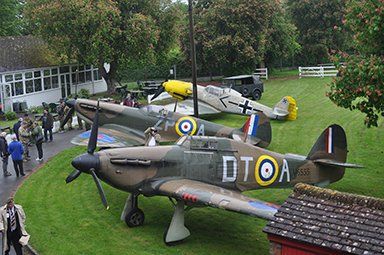Battle of Britain Day
15 September
“Never in the field of human conflict was so much owed by so many to so few.”
Winston Churchill
One of the most famous quotations of World War Two, Prime Minister Winston Churchill’s emotion-charged tribute was to the Royal Air Force and the young fighter pilots who, in 1940 – facing odds of five to one – held off the weight of Hitler’s Luftwaffe, attacking Britain from a conquered Europe. In full knowledge that they were outnumbered and overwhelmed, the brave young pilots took to the skies time and time again. Without the might, dedication and determination of our Royal Air Force and the sheer bloody-mindedness of the British people, this once proud land may have been invaded by Germany, falling under Nazi rule.
80 years ago today was the climax of the battle. 500 enemy aircraft attacked Britain, in a running fight from the coast of France to Kent and London and one that defined the future of this battle.
The first wave departed Germany at 10.10am, the Luftwaffe aircraft triggering the alarm at the Chain Home (CH) early warning radar station at Dover at 10.30am. The first engagements were at 11.15am. Two squadrons covered the air space over Canterbury, four over Biggin Hill and Maidstone and two over Chelmsford as backup. During the fights, a Dornier crashed at London Victoria station, its bombs damaging Buckingham Palace, its pilot landing at The Oval cricket ground.
The aircraft returned to their bases in England and France to refuel and repair; British reconnaissance aircraft photographed every port from Antwerp to Cherbourg returning with evidence of increasing build-up of amphibious forces. Invasion was imminent, this battle was critical.
At 1.45pm Chain Home radar again picked up approaching enemy forces. Ultimately 276 Spitfires and Hurricanes were scrambled to meet waves and waves of German aircraft who outnumbered the British two to one. For every two RAF fighters there were three Messerschmitt Me109s. The action continued over London, with the RAF taking control, cutting the German fighter escorts from its bombers.
At 3pm the Luftwaffe took off towards Southampton to bomb Royal Navy targets – again radar forewarned of their approach and they were intercepted by six Spitfires, preventing major damage.
At 5.55pm the Luftwaffe arrived near another target of the Spitfire factory near Southampton, meeting with guns engaging them without cease until the RAF appeared. Again minor damage sustained – the opposite would have been devastating to Spitfire production.
Luftwaffe attacks continued during the night, Liverpool and Birkenhead sustained widespread damage with other cities along the south coast of England, Wales and northern
England reporting damage.
On this heavy day of fighting, Fighter Command shot down 56 German aircraft, convincing the German High Command that the Luftwaffe could not achieve air supremacy over Britain, and the next day daylight attacks were replaced with night-time sorties as a concession of defeat. Two days later, on 17 September 1940, Hitler postponed Operation Sea Lion.
